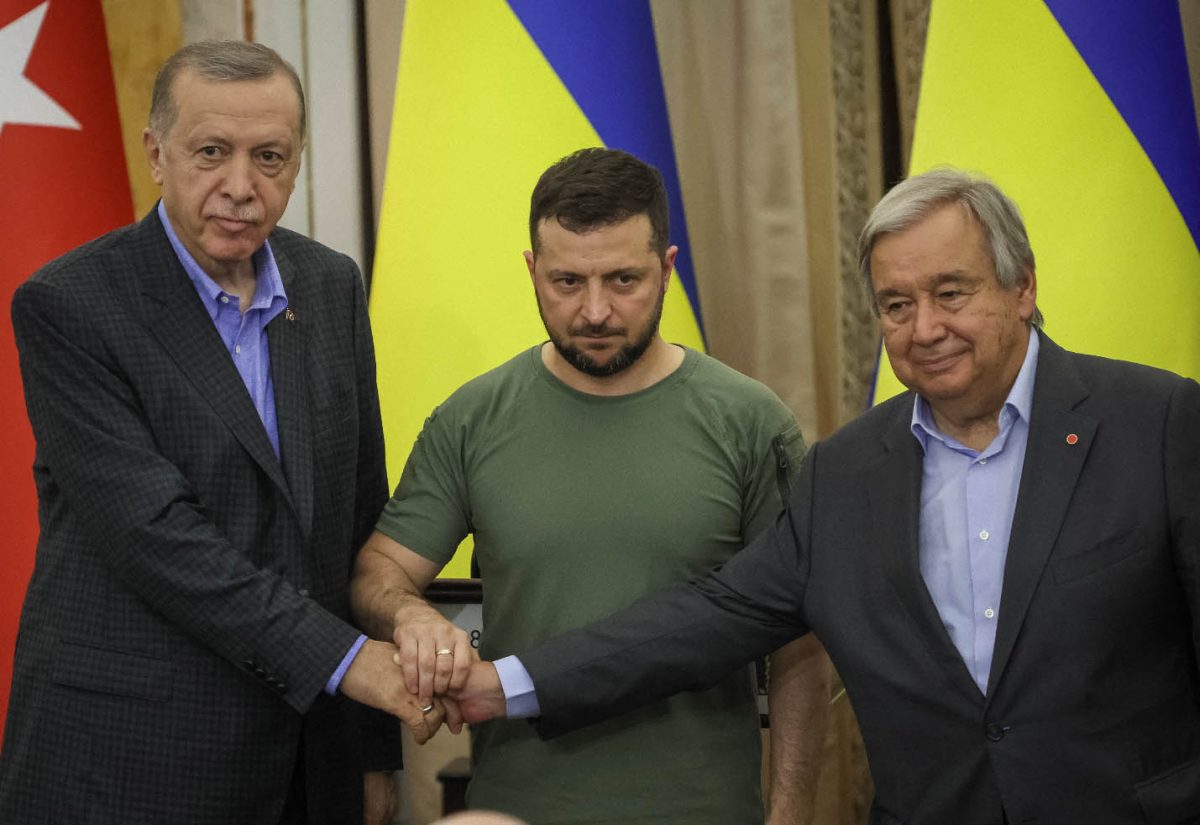KYIV/LVIV, Ukraine, (Reuters) – The U.N. chief and the presidents of Turkey and Ukraine yesterday discussed ways to end Kyiv’s conflict with Russia and secure Europe’s largest nuclear power station, which has come under shelling at the front lines.
Speaking with reporters after talks in Ukraine, U.N. Secretary-General Antonio Guterres said he was gravely concerned by the situation at the Zaporizhzhia nuclear plant and called for military equipment and personnel to be withdrawn.
After talks in the western Ukrainian city of Lviv, Turkey’s President Tayyip Erdogan said he, Guterres and Ukrainian President Volodymyr Zelenskiy discussed building on recent positive atmosphere to revive peace negotiations with Russia that took place in Istanbul in March.
In a deal brokered by the U.N. and Turkey, the two sides recently reached an agreement for Russian to lift a blockade of Ukrainian grain shipments, and exports have started to resume.
NATO member Turkey has maintained good relations with Russia, an important trade partner, and sought to mediate in the six-month-old conflict.
“Personally, I maintain my belief that the war will ultimately end at the negotiating table. Mr Zelenskiy and Mr Guterres have the same opinion in this regard,” Erdogan said.
There was no immediate comment from Moscow.
Meanwhile, 17 people were killed and 42 injured in two separate Russian attacks on the major northeastern Ukrainian city of Kharkiv, the regional governor said on Thursday.
Three civilians were killed and 17 wounded in a pre-dawn rocket strike on Thursday, the local emergency service said. That followed a Russian attack on Kharkiv on Wednesday, in which the emergency service initially said 12 people were killed.
Also yesterday, at least four explosions hit near a major Russian military airport on the Moscow-controlled Crimean peninsula, three local sources said. Ukraine has hinted it orchestrated other blasts over the last 10 days at other Russian installations in Crimea.
The sources said yesterday’s explosions were near Russia’s Belbek military airport, north of the Black Sea fleet’s headquarters in Sevastopol.
Sevastopol governor Mikhail Razvozhayev, writing on Telegram, said Russian anti-aircraft forces downed a Ukrainian drone and no damage occurred.
Guterres reiterated calls for demilitarisation around the nuclear plant.
“The facility must not be used as part of any military operation. Instead, agreement is urgently needed to re-establish Zaporizhzhia’s purely civilian infrastructure and to ensure the safety of the area,” Guterres said.
Russia, which captured Zaporizhzhia soon after its Feb. 24 invasion of Ukraine, said it could shut down the facility – a move Kyiv said would increase the risk of a nuclear catastrophe.
Moscow had earlier rejected as “unacceptable” international calls for a demilitarised zone around the nuclear plant, which is still operated by Ukrainian engineers under Russian occupation.
The power station sits on the Russian-controlled south bank of a huge reservoir; Ukrainian forces hold the north bank. Recent days have seen several incidents of shelling at the plant, which both sides blame on each other.
Ukraine also accuses Russia of using the plant as a shield for its forces to launch strikes across the reservoir on Ukrainian-held cities, which Moscow denies.
Reuters cannot independently confirm the military situation in the area or responsibility for shelling.
Zelenskiy said after meeting Guterres yesterday that they had agreed parameters of a possible mission of the International Atomic Energy Agency to the plant.
“Russia should immediately and unconditionally withdraw its forces from the territory of Zaporizhzhia nuclear power plant, as well as stopping any provocations and shelling,” he said.
Earlier, he accused Russia of “nuclear blackmail”.

